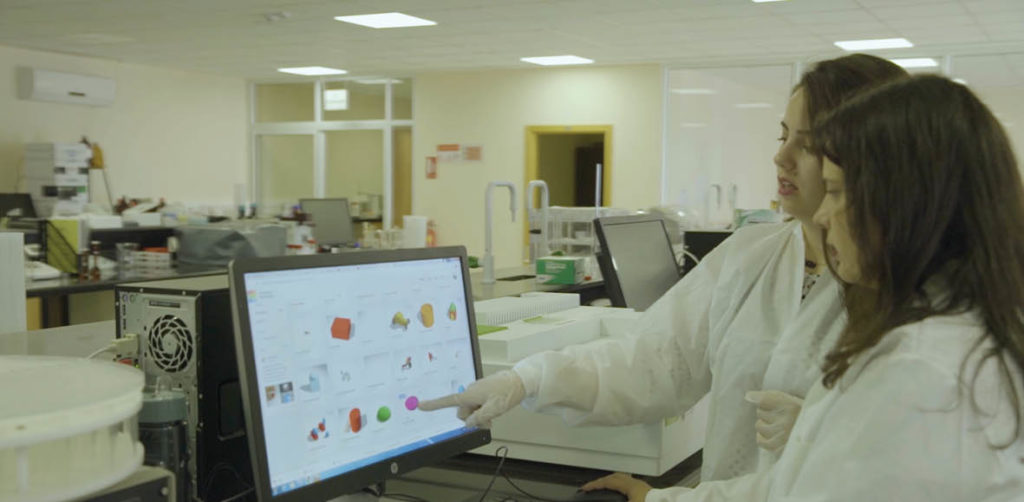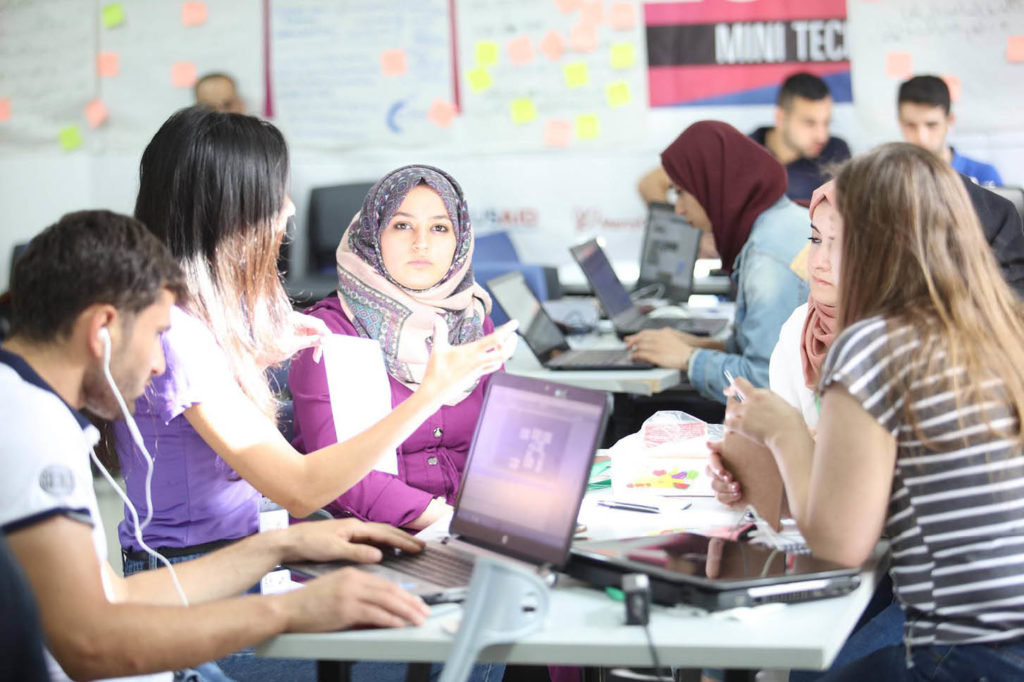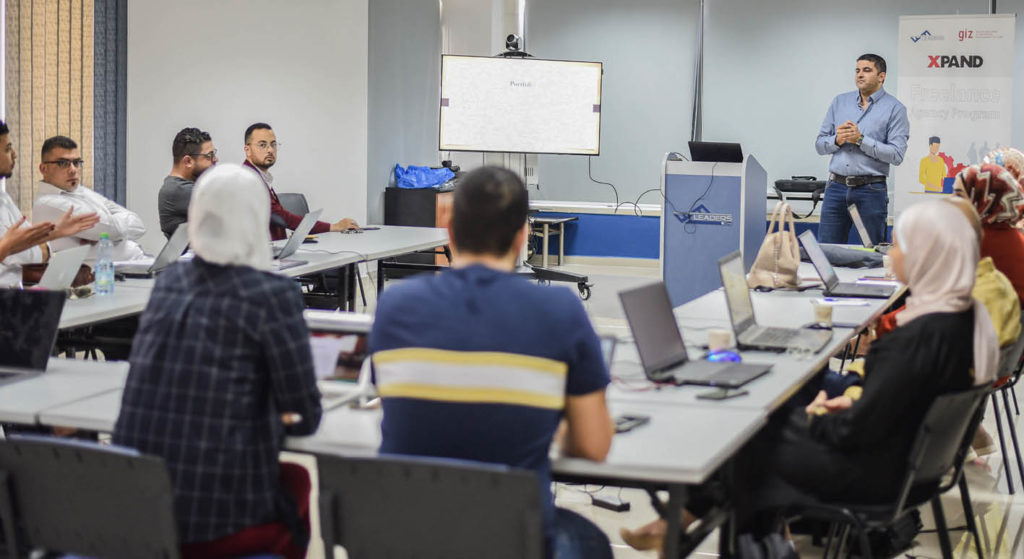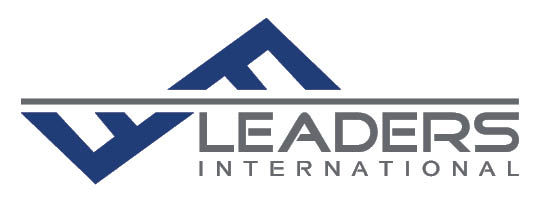As the world reaches the end of incrementalism, the Palestinian economy struggles to innovate, disrupt, and create change at the same speed and scale as worldwide technology progress. The developing economy of Palestine is constrained by the political situation and poor e-infrastructure, which is reflected in the degree of expansion and innovation that a Palestinian start-up can bring to the economy. With the rise of Generation Z and the growth of the gig economy, Palestinian freelancers as well find it hard to compete at the regional and international levels. These challenges have called for a change in the economic development model and raised many questions about the quality of the Palestinian talent pool and its capability to produce innovative start-ups and businesses.
During the past fifteen years of economic development in Palestine, the bottom-up approach has proved to be more aligned to the national needs of the economy than its top-down counterpart. Before Palestinian entrepreneurs can gain access to finance and new markets, their business skill sets, culture, and education must be addressed. Development projects that responded to weaknesses and challenges at the grassroots level have managed to create more impact than those that focused on grasstops through venture capital (VC) and market-penetration strategies. The Palestinian talent pool was simply not ready. It needed the proper innovation culture and the disruptive environment in order to grow. Universities and schools needed to integrate the studies of innovation and entrepreneurship into their curricula so that their graduates could compete in the job market, whether as entrepreneurs or as freelancers.

Universities were recently able to produce innovative start-ups only after distinctive research projects were given the chance to be commercialized and turned into scalable business ideas. In the last two years, we’ve noticed the rise of around 30 minimum viable products from university students. We have witnessed the growth of multiple health start-ups that have the potential to expand and disrupt health care not only in Palestine but in the region as well. On the list of these start-ups is Pharma New Leader, whose use of 3-D printing technology promises to improve the production and responsiveness capability of orphan drugs – pharmaceutical products that are commercially undeveloped because they treat rare diseases. RadiologAI, is another university research project that was commercialized to use AI technology to analyze X-ray images and accurately identify bone fractures, minimizing recently increasing medical malpractice and human error.

Apart from education, capacity building and funding at various stages has played a key role in developing the capacity of some Palestinian start-ups, especially those that have succeeded in keeping their products unique, market-driven, competitive, and scalable. Doroob, for example, is one of the promising Palestinian start-ups. It is the first mapping, navigation, and location-based solution to cover the West Bank and Gaza. The mobile application is currently being used by Palestinians, tourists, and expatriates, and is recommended by a number of diplomatic missions to their nationals visiting and residing in Palestine. Another promising success story is that of Mnjam, a green start-up that aspires to decrease plastic pollution by around 50 percent if its solution is used by every household in Palestine.
At the ecosystem level, capacity-building programs target not only start-ups but the whole pipeline. The expertise and capacity development of Palestinian incubators, accelerators, and business development service providers has resulted in better ideation, scalability, testing, and business growth. On the other hand, development projects should not overlook the potential of the Palestinian gig economy, which can compete regionally and internationally if given the needed capacity-building resources on international freelancing platforms such as Upwork and Freelancer.com. In order to maintain the quality and transparency of such capacity-building programs, the economy must produce and adopt more efficient and reliable digital-for-development solutions. BOOST is one solution that stakeholders across the value chain have been able to utilize for the benefit of ecosystem development.

Another strategy that can change the realities of the start-up economy in Palestine is initiating policy dialogue with the Palestinian government. Initiatives such as the Open Data Government Initiative are crucial in enabling start-ups to conduct market research and analysis, cultivating an evidence-based, decision-making environment at all business levels. Open data can ultimately improve our start-ups’ competitiveness and readiness to cope with market changes. It creates and bolsters the e-infrastructure that start-ups require to collect information and make informed decisions.
To this day, the start-up economy in Palestine has not been able to find or identify its competitive advantage. This is due to the lack of specificity in planning and managing economic development projects. Many questions have yet to be asked. What is the Palestinian national economic need for start-ups aside from job creation and revenue making? What needs to be solved through start-up solutions? What are our expectations of the start-up community? Should we prioritize AI, solar energy, fintech, P2P, or health-care start-ups? What prevents the ecosystem from amending its policies and regulations?
After more than 15 years of managing economic development and innovation projects in Palestine, we believe that it is worth giving niche industries the chance to grow and flourish. Concepts such as eco-innovation, smart cities, and solar technology have the advantage to solve problems that are specific to the Palestinian people, and at the same time, scale and expand into regional markets. Integrating eco-innovation can decrease plastic pollution, enhance nature’s resilience to other environmental pressures, and lead to the responsible use of natural resources. Smart-city innovation and IoT, on the other hand, can precipitate the creation of innovative public services, transportation, entertainment, and e-commerce. Innovation at niche industries is expected to change the dynamics of the economy, unlock the potential of diverse talents, and create an impact at a multi-sectoral level.

A key factor in the success of any economy, especially an innovative one, is diversity and equality. Again, it is the grassroots that need to be addressed in order to integrate gender mainstreaming and give equal opportunities to women freelancers and women-led start-ups. It is the culture of equality that needs to grow to empower and engage women, youth, and people with disabilities; on the other hand, development organziations will have to respect and work with a social mix of innovative, diverse, and modern talents.
Despite all economic and socio-political challenges, the realities of the start-up economy in Palestine remain promising. During the past two years, it has become clear that the talent pool is growing, the start-up ecosystem pipeline is improving, incubators’ expertise is developing, education is on the road to recovery, and the culture of innovation is flourishing.


